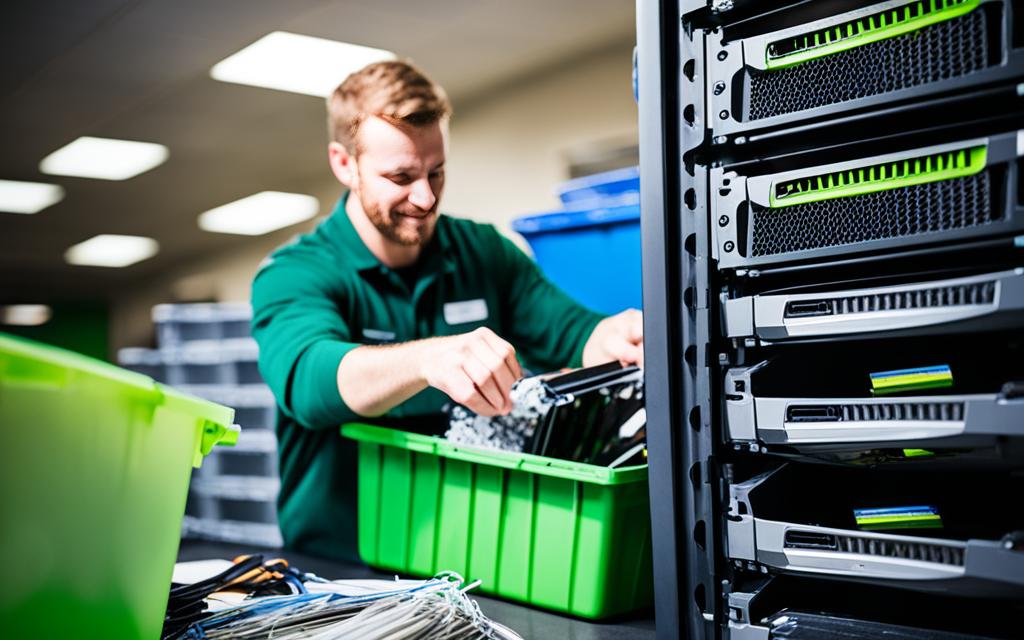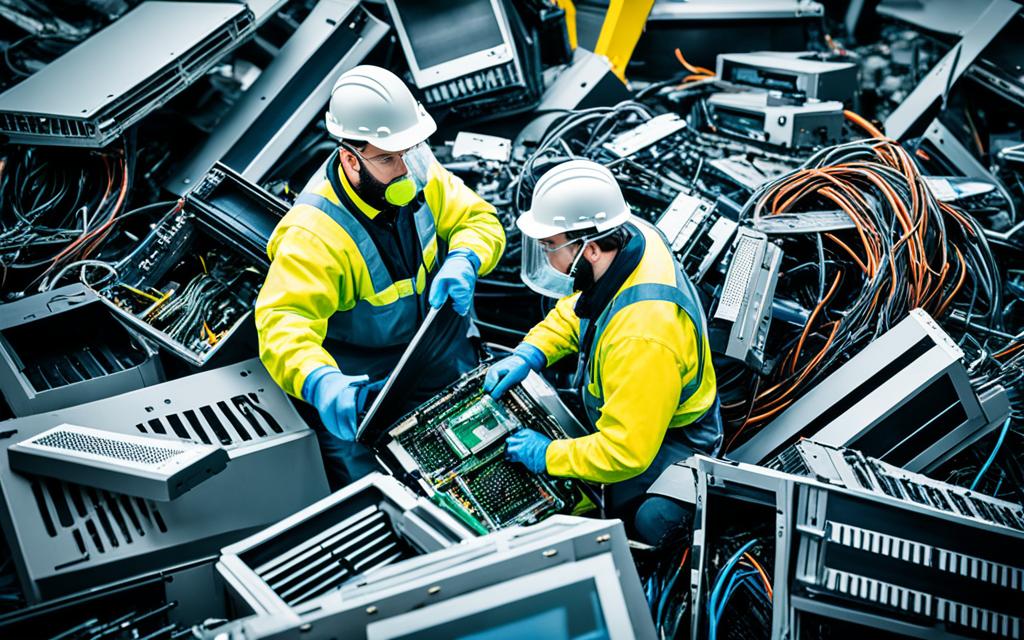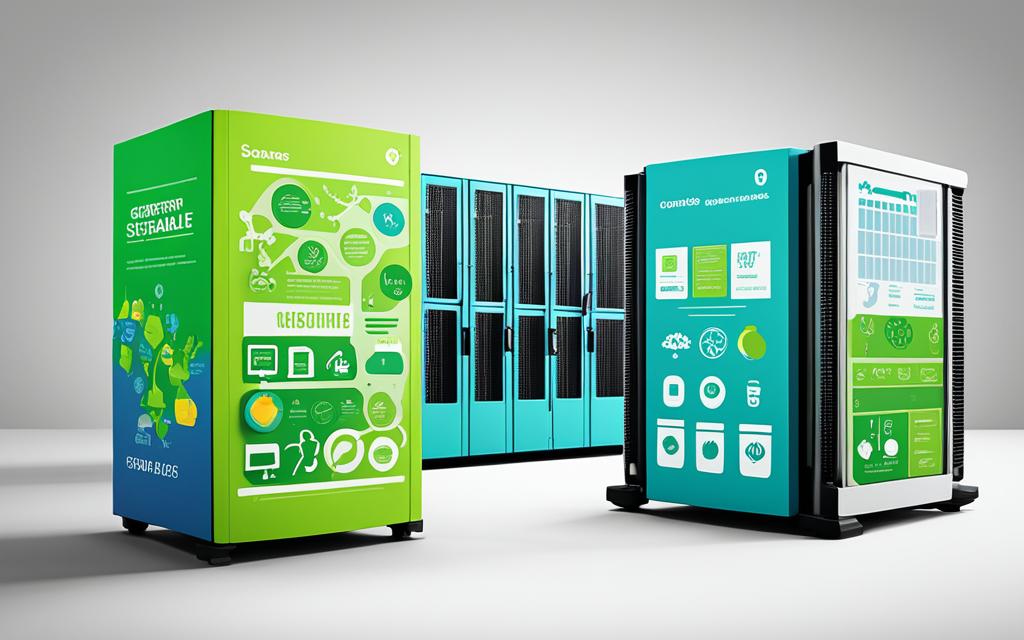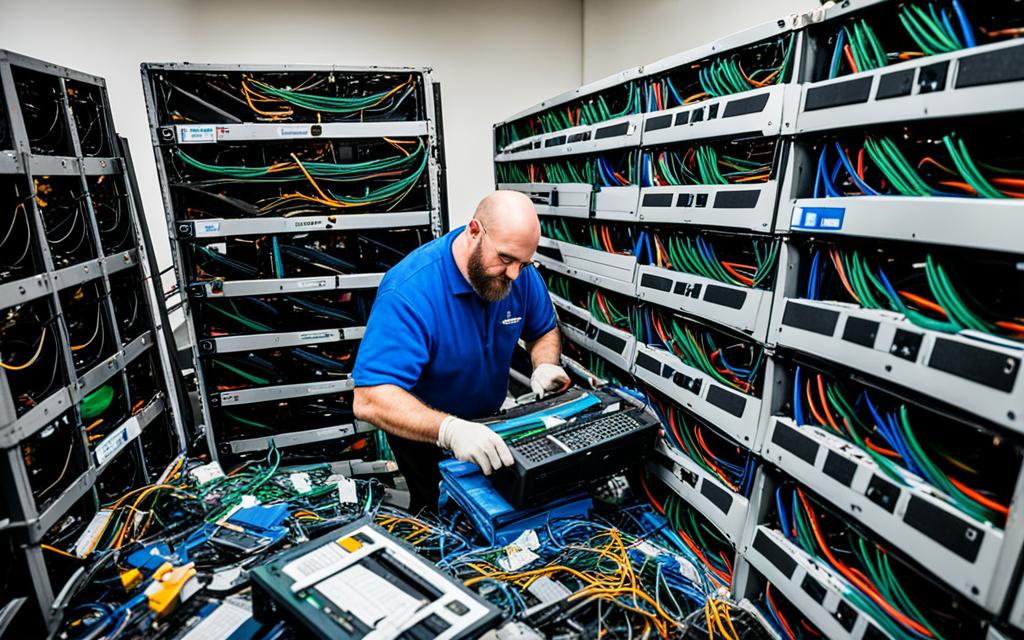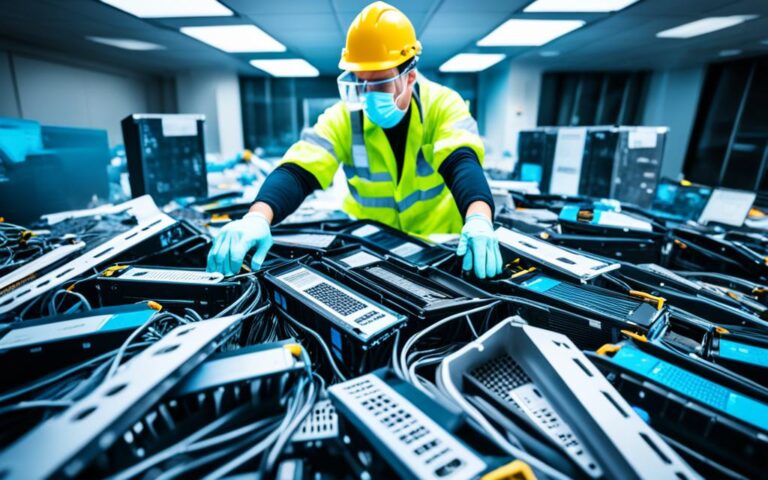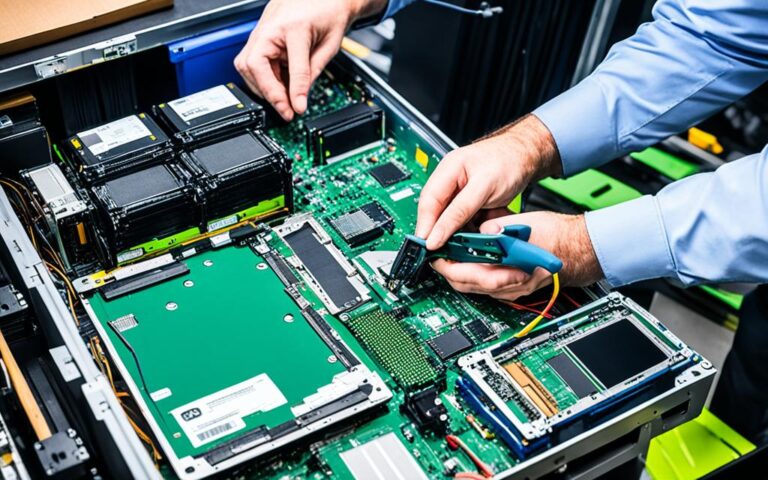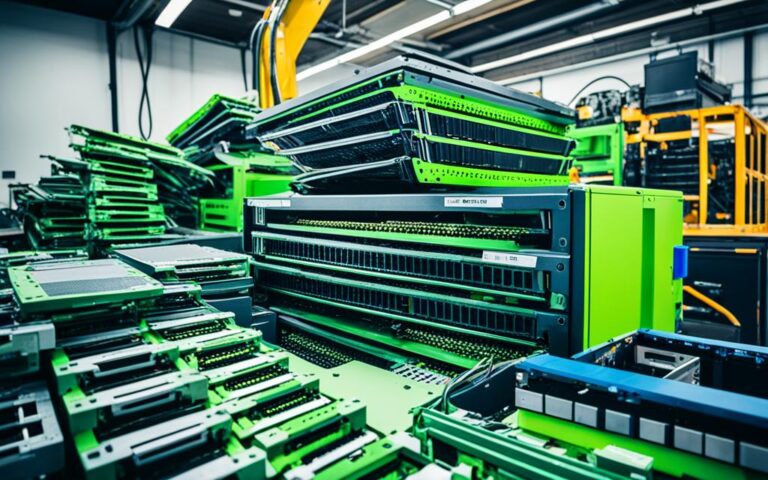How to Measure the Success of Your Server Recycling Program
Server recycling is an essential aspect of IT asset management and disposition (ITAD) that businesses need to prioritize. It helps reduce environmental impact, ensure data security, maintain regulatory compliance, and optimize IT investments. To gauge the success of your server recycling program, you need to establish specific metrics and best practices. This article will guide you on how to measure the success of your server recycling program and embrace sustainable IT management.
Implementing a successful server recycling program offers numerous benefits for businesses. It demonstrates environmental stewardship and a commitment to sustainability, enhances the organization’s reputation, ensures data security, maintains regulatory compliance, and brings cost savings. By partnering with industry-leading IT asset management companies like UCS Logistics, businesses can achieve a more sustainable future through responsible server recycling. Contact UCS Logistics today to optimize your server recycling process and contribute to a greener tomorrow.
Importance of Server Recycling
Server recycling holds significant importance for businesses for several reasons. Firstly, it promotes environmental responsibility by reducing the environmental footprint caused by e-waste. By participating in server recycling programs, businesses take proactive steps towards a sustainable future, minimizing their impact on the environment.
Secondly, server recycling ensures data security by securely destroying sensitive data during the recycling process. With the increasing number of data breaches and cyber threats, it is crucial for businesses to prioritize the safe disposal of servers to prevent unauthorized access to confidential information.
Thirdly, server recycling helps organizations maintain regulatory compliance by adhering to proper electronic waste disposal practices. Many countries and regions have strict regulations in place regarding the disposal of electronic equipment, including servers. By responsibly recycling servers, businesses mitigate the risk of non-compliance and potential penalties.
Lastly, server recycling allows businesses to optimize costs and recover value from their IT assets. Instead of incurring hefty disposal costs, companies can partner with reputable recycling providers who can refurbish or resell usable components, allowing businesses to recoup some of their IT investments.
“Server recycling is more than just a means of disposing of outdated hardware. It represents a commitment to environmental responsibility, data security, regulatory compliance, and cost optimization. By recycling servers, businesses can align their IT practices with sustainable and ethical standards while reaping the financial benefits.”
| Benefits | Description |
|---|---|
| Environmental Responsibility | Reduce e-waste and minimize environmental impact |
| Data Security | Securely destroy sensitive data during recycling |
| Regulatory Compliance | Adhere to electronic waste disposal regulations |
| Cost Optimization | Recover value from IT assets and reduce disposal costs |
By understanding the importance of server recycling, businesses can take proactive steps towards a more sustainable and secure future while optimizing their IT investments.
Best Practices for Effective Server Recycling
To ensure effective server recycling, businesses must follow best practices. By implementing these practices, you can optimize your server recycling processes, enhance data security, and contribute to a sustainable future.
Develop an ITAD Policy
Firstly, it is crucial to develop a comprehensive IT Asset Disposition (ITAD) policy that aligns with your organization’s goals and regulatory requirements. This policy will serve as a framework for managing the entire lifecycle of your IT assets, including servers.
Inventory Your IT Assets
Secondly, maintaining an accurate inventory of your IT assets is essential for effective server recycling. This includes servers and other equipment. By keeping a record of your assets, you can track and manage them properly throughout their lifecycle.
Partner with a Reputable Recycling Provider
Thirdly, it is important to partner with a reputable server recycling provider. Look for a provider that ensures proper handling, secure data destruction, and compliance with regulations. Working with a trusted partner will give you peace of mind that your servers are recycled responsibly.
Ensure Data Security
Data security is a top priority when it comes to server recycling. When selecting a recycling provider, ensure they offer certified data destruction services. This ensures that all sensitive data stored on the servers is securely destroyed, minimizing the risk of data breaches.
Monitor and Evaluate
Lastly, continuously monitor and evaluate your server recycling processes. Regularly assess your recycling practices to identify areas for improvement and ensure ongoing compliance with regulations. By monitoring and evaluating your processes, you can maintain the effectiveness of your server recycling program.
By implementing these best practices, businesses can develop a robust server recycling program that promotes data security, environmental sustainability, and regulatory compliance. Partnering with a reputable recycling provider, such as UCS Logistics, can further enhance the success of your server recycling initiatives.
Benefits of Server Recycling for Businesses
Implementing a successful server recycling program offers several benefits for businesses. Firstly, it demonstrates environmental stewardship and a commitment to sustainability, enhancing the organization’s reputation. Secondly, it ensures data security by securely destroying sensitive data, reducing the risk of data breaches. Thirdly, server recycling helps businesses maintain regulatory compliance, avoiding fines and penalties. Additionally, businesses can achieve cost savings by recovering value from old servers, reducing disposal costs, and optimizing their IT investments.
By embracing server recycling, businesses actively contribute to environmental stewardship. The responsible disposal of e-waste reduces the carbon footprint and minimizes the harmful impact on our planet. This commitment to sustainability not only aligns with the global movement towards a greener future but also resonates with environmentally conscious customers who prioritize businesses with a sustainable ethos.
It is our responsibility to protect the environment and ensure that future generations can enjoy a clean and healthy planet. By recycling servers, businesses play a crucial role in minimizing electronic waste and conserving valuable resources, fostering a better world for all.
Data security is another critical advantage provided by server recycling. Properly destroying sensitive information stored on retired servers ensures that confidential data remains secure and protected. By partnering with a reputable recycling provider that follows stringent data destruction protocols, businesses can mitigate the risk of data breaches and safeguard their intellectual property, trade secrets, and customer information.
Server recycling also enables businesses to maintain regulatory compliance. By adhering to electronic waste disposal regulations and industry standards, organizations can avoid costly fines and penalties. Compliance not only ensures legal obligations are met, but it also reinforces the organization’s reputation as a responsible corporate citizen.
Furthermore, server recycling presents an opportunity for businesses to achieve significant cost savings. Recovering value from old servers through recycling programs allows companies to maximize the return on their IT investments. By minimizing disposal costs and potentially generating revenue from the sale of reusable components, businesses can allocate resources more efficiently and invest in the latest technology.
Partner with UCS Logistics for Sustainable Server Recycling Solutions
UCS Logistics is a trusted leader in IT asset management and offers comprehensive server recycling solutions. With strict adherence to data security protocols, regulatory compliance, and sustainability practices, UCS Logistics ensures a seamless and environmentally responsible server recycling process. By partnering with UCS Logistics, businesses can enhance their environmental stewardship, improve data security, maintain regulatory compliance, achieve cost savings, and elevate their reputation.
Conclusion
Server recycling is an essential component of sustainable IT management and plays a crucial role in creating a more environmentally responsible future. By implementing best practices and partnering with reputable recycling providers, businesses can measure the success of their server recycling program and unlock a myriad of benefits.
Through server recycling, companies demonstrate their commitment to environmental responsibility, reducing the negative impact of electronic waste and promoting a greener, more sustainable approach to IT asset management. Additionally, businesses can protect sensitive data by securely destroying it during the recycling process, mitigating the risk of data breaches and safeguarding their reputation.
Furthermore, embracing server recycling helps organizations maintain regulatory compliance by adhering to proper disposal practices, avoiding fines and penalties. Apart from the environmental and security benefits, businesses can also achieve cost savings by recovering value from old servers, optimizing their IT investments, and reducing disposal expenses.
To optimize your server recycling process and ensure a sustainable future, consider partnering with UCS Logistics, a leading IT asset management company that offers comprehensive server recycling solutions. Together, let’s pave the way for a more sustainable and responsible approach to IT asset management.
FAQ
What is server recycling?
Server recycling is the process of disposing of old or unwanted servers in an environmentally responsible manner. It involves safely removing any sensitive data and recycling the server components to reduce e-waste.
Why is server recycling important?
Server recycling is important for several reasons. It reduces the environmental impact of electronic waste, ensures data security by destroying sensitive information, helps maintain regulatory compliance, and allows businesses to recover value from their IT investments.
How can I measure the success of my server recycling program?
To measure the success of your server recycling program, you can establish specific metrics such as the number of servers recycled, the amount of e-waste diverted from landfills, cost savings achieved through recycling, and the overall reduction in environmental impact.
What are the best practices for effective server recycling?
The best practices for effective server recycling include developing a comprehensive ITAD policy, maintaining an accurate inventory of IT assets, partnering with a reputable recycling provider, ensuring data security through certified data destruction services, and continuously monitoring and evaluating the recycling processes.
What are the benefits of server recycling for businesses?
Server recycling offers several benefits for businesses, including demonstrating environmental stewardship and sustainability, ensuring data security and reducing the risk of data breaches, maintaining regulatory compliance, achieving cost savings through value recovery, and enhancing the organization’s reputation.
How can I optimize my server recycling process?
To optimize your server recycling process, you can reach out to UCS Logistics, a leading IT asset management company that offers comprehensive server recycling solutions. They can provide guidance and services to ensure the success of your server recycling program and contribute to a more sustainable future.

